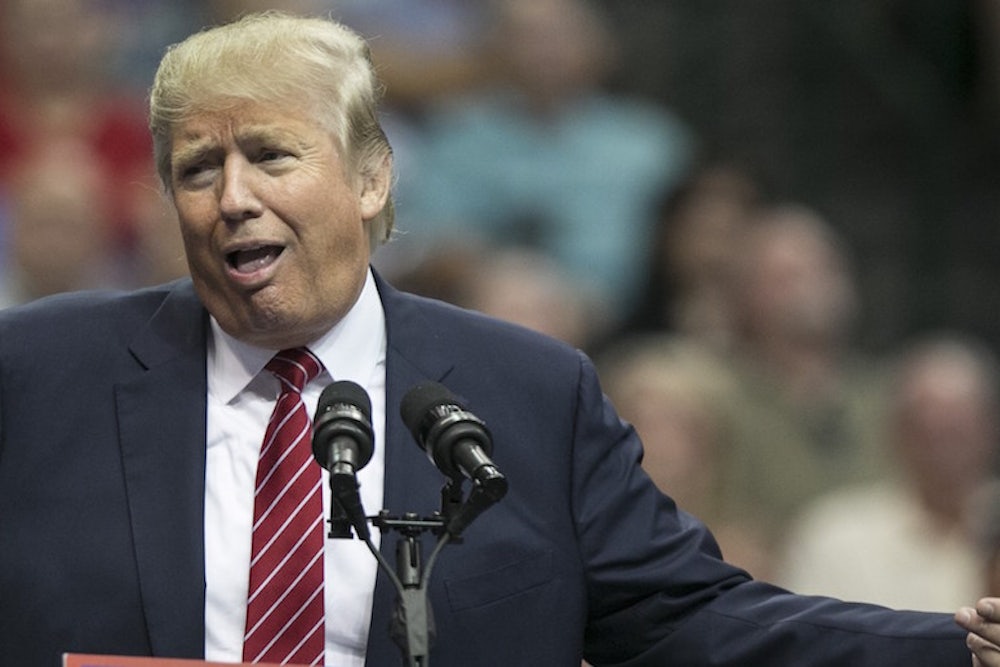Jeb Bush recently argued that no candidate, including Donald Trump, could insult his way to the GOP nomination or the presidency. Trump is setting out to test that thesis. He has derided Bush's lack of virility, Lindsey Graham's posture, and even Carly Fiorina's face. These insults are plainly juvenile, but they are also highly calculated and insidious. They confront their targets with an impossible conundrum: respond in kind, and stoop to Trump’s level, or respond slowly and allow the insults to seep into the Republican voter psyche.
Part of what makes Trump's insults so sticky, though, is that they are true—or at least contain a kernel of truth, intended or otherwise.
If these insults were plainly false, Trump would look (more) ridiculous. But examine them closely, and it becomes clear that Trump grasps his opponents’ weaknesses and insecurities much better than they grasp his. Consider the most famous Trump insult, which he leveled (repeatedly) at Bush and has since directed at Ben Carson: Both men, he says, are too “low energy” to be president. Bush and Carson responded in different ways, but with the same basic message—“I am NOT low energy!”—that you’d expect to hear from someone correctly accused of being low energy. This compounds the problem, but it’s only a problem in the first place because both Bush and Carson are actually subdued in manner, which gives the original claim real resonance.
Trump has parlayed this attack, meant to evoke a lack of manly vigor, into other, easier to substantiate attacks against both men.
“Ben Carson’s a very, very nice man,” Trump said on CBS. “But this will not be a good situation because of the fact that he’s not a dealer, he’s not a negotiator.”
This is neither disputable nor particularly controversial. Business and politics are great places to develop negotiating skill, whereas a neurosurgeon who drove a hard bargain would probably be a much less successful neurosurgeon than Ben Carson has been. As for Bush...
Jeb’s policies in Florida helped lead to its almost total collapse. Right after he left he went to work for Lehman Brothers—wow!
— Donald J. Trump (@realDonaldTrump) September 8, 2015Here again, Trump has put his finger on real liabilities. Bush’s policies probably weren’t the biggest contributor to Florida’s real estate bubble, but it’s at least arguable that a governor faced with a dangerous real estate bubble should take steps to mitigate it, rather than foster it, and claim credit for his state’s illusory economic growth. Because he left office before the bust, he continues to claim credit for the growth that occurred on his watch, and he did indeed go on to work for Lehman Brothers.
As, by the way, did Ohio Governor John Kasich, who’s been outperforming expectations.
What people don’t know about Kasich- he was a managing partner of the horrendous Lehman Brothers when it totally destroyed the economy!
— Donald J. Trump (@realDonaldTrump) May 20, 2015Trump’s barbs come in one other main thematic form: “Why is anybody listening to this loser?”
"What a stiff, what a stiff, Lindsey Graham,” Trump said at a July event in Graham’s home state of South Carolina. “By the way he has registered zero in the polls.”
Graham’s polling has been notoriously abysmal, and his performance in the first under-card debate validated Trump’s more subjective critique.
Trump’s first and most vocal critic, former Texas Governor Rick Perry, has already exited the race. He stood no chance against Trump’s rejoinder which, though unsubtle, tapped into something a lot of people already believed about Perry.
"He's doing very poorly in the polls,” Trump said. “He put on glasses so people will think he's smart. And it just doesn't work! You know people can see through the glasses.”
Most recently—during the same appearance on CBS in which he criticized Carson—Trump argued that Carly Fiorina “had tremendously—you could call it bad luck, you can call it she did a bad job. But Hewlett-Packard was a disaster. Lucent, the company she was at before Hewlett-Packard, was a disaster. These were two disastrous reigns. And you say now she’s running for president. Then of course she lost in a landslide to Barbara Boxer.”
None of this is remotely controversial. Of course, Trump’s purpose here was to clarify (or create a diversion from) an earlier and much more boorish attack. “Look at that face!” Trump mocked. “Would anybody vote for that?”
On the one hand, this is irredeemable, sexist garbage. But on the other hand, female presidential candidates—none of whom have represented either major party—have received vanishingly few votes over the course of U.S. history. While 18 million people famously supported Hillary Clinton during the 2008 primary, the party ultimately selected a candidate with a more masculine looking face. And those were Democrats! Republican voters are much less open to the idea of female leadership.
Trump was giving voice to a vile sentiment. It just happens to be one that a large percentage of Republican voters don't consider out of bounds. In that sense, his doubts about this particular rival's electoral chances might prove to be true as well.
